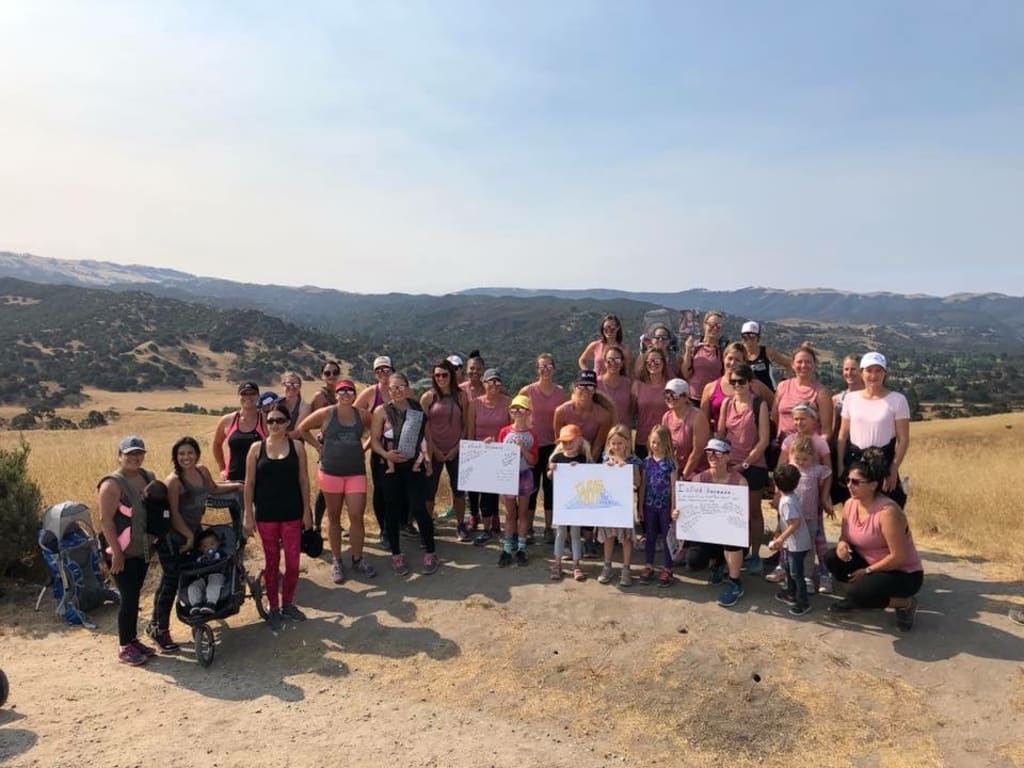Overcoming Postpartum Mood Disorders Through the Help of Community
My Battle with Postpartum Anxiety and PTSD and How Finding a Group of Women Helped Pull Me out of the Darkness and Empowered Me to Help Other New Moms

In 2014, I found myself unexpectedly pregnant. I struggled with the idea of becoming a mother when all of my dreams were suddenly within my grasp. My husband and I had just quit our 9 to 5 job, moved to a Hawaii, and had begun to manage a gym. Having a kid was not in my cards, and I knew that having a child was going to make a lot of aspirations take a back seat. I suddenly became very aware that I was unprepared for life as a “real” adult. My husband, in an effort to obtain better healthcare, went active duty military and deployed almost immediately. All of a sudden I was pregnant, alone, and feeling the weight of the world on my shoulders. I struggled with health concerns during my pregnancy, and I plummeted into an unspoken (and therefore undiagnosed) darkness. Looking back now, I know this was perinatal depression. I didn’t speak of it, mostly because the fear of being “sad” or labeled frightened me.
In 2015, my daughter was born, and I found myself in a new struggle. Combined with a natural hormonal crash postpartum, my husband deployed again, and my daughter suddenly started to exhibit signs of breath-holding. Alone in our house, I watched my six-week-old stop breathing and called 911. The paramedics administered oxygen while I felt myself hover over my body, observing as an outsider—almost like watching a movie unfold. They suggested I take her to the hospital, and without thinking or grabbing any items, I got in the car and left.
At the hospital, I had an army (literally and figuratively) of doctors and medical professionals descend upon me. They took my baby away from a feeding (we were breastfeeding) and started administering tests. They had me hold her legs as she screamed in an infant chest X-ray machine, had me force feed her chalky substances while she was strapped into a machine to watch her digestive tract, they shoved tubes in her mouth and her nose, they hooked her up to monitors and drew blood. A doctor finally told me she had ALTE, acute life-threatening episodes (I know now it was laryngomalacia) and admitted us. I was alone.
Upon discharge from the hospital, I started to have panic attacks. I was constantly worried if I was a good enough mother, if she was going to stop breathing, if my husband would deploy again and I’d have to call 911 by myself. At a checkup for my daughter, I looked at the pediatrician and started to cry. I told her I wasn’t okay. She quickly swept me into another room and a counselor spoke to me. I was later diagnosed with postpartum anxiety and PTSD. I took the diagnosis and never did anything with it. I was too afraid of the stigma.
In 2017, with the help of my wonderful community, Stroller Strong Moms, I attended a Climb Out of the Darkness event. An event that was meant to shed light on perinatal mood disorders and postpartum depression, anxiety, PTSD, etc. I went as a silent supporter, not realizing what an impact it would make. I stood in a crowd of friends, family, peers, and complete strangers and suddenly felt not alone. For the first time in this journey, I wasn’t alone. I was one in seven women diagnosed with a disorder, but I wasn’t alone.
Because of this Climb Out of the Darkness event, I finally sought help from a therapist and spiritual counselor. I spoke to my doctor about my anxiety and was prescribed a medication to help relieve the crippling panic attacks related to my daughter’s hospital stay. I finally, two years after my daughter’s birth, got the help I needed. I am better today, profoundly changed, because of this event.
I am a new person, strong and confident in my skin, firmly rooted in my beliefs as a mother, because of a community of other mothers. I know it is so important to help other women and families overcome the fog of postpartum anxiety, postpartum depression, PTSD, and perinatal mood disorders
If you are ever alone or feeling down, it’s real. It’s normal. Parenting is hard, but we’re all in this together. I feel empowered to share my stories with you because if I can be the change or be the light for one person, I will feel like I have done well. As women, we deserve to support each other through pregnancy, childbirth, postpartum, and loss. As we band together in happiness, so should we in times of turmoil. There are so many people out there wanting to help you. You are not alone—and you are strong enough to overcome this.
If you like what you have read, or if you can relate, please leave a tip so I can continue to empower and educate other women and families about postpartum and perinatal mood disorders.
About the Creator
Bree Scurti
Mother, athlete, and coach. I aim to empower other women through fitness and encourage mothers to speak their truth about parenthood, postpartum, and loss.






Comments
There are no comments for this story
Be the first to respond and start the conversation.